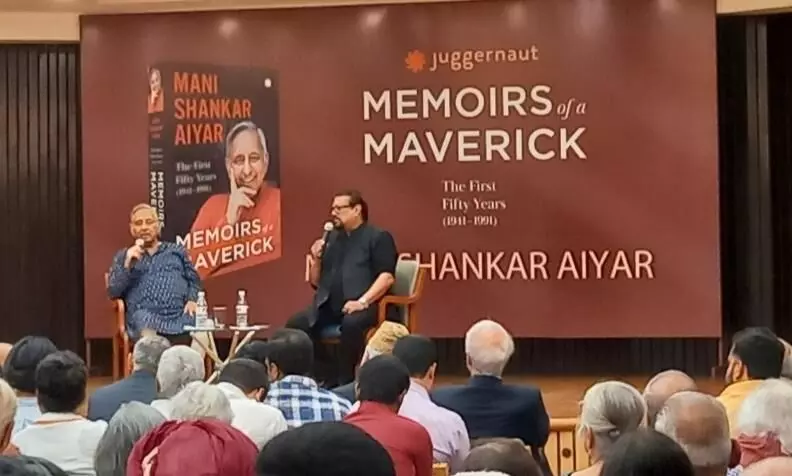
P.V. Narasimha Rao was India’s first BJP PM; was communal; he led the nation to communal path: Mani Shankar Aiyar
text_fieldsNew Delhi: Veteran Congress leader and former Union minister, Mani Shankar Aiyar, described P.V. Narasimha Rao as India's "first BJP prime minister," alleging that he steered the nation from “the secular path to the communal path.”
The former diplomat was speaking to The Wire at the launch of his autobiography ‘Memoirs of a Maverick: The First Fifty Years (1941-1991)’ on Wednesday.
Aiyar said that he discovered “how communal” the former prime minister was, during a discussion on secularism, as quoted by The Wire.
“When I was on my Ram Rahim Yatra from Rameshwaram to Ayodhya, I was summoned from Odisha to come back to Delhi and Narasimha Rao said to me, ‘I don’t disagree with your yatra but I do have a disagreement with your definition of secularism,” he said.
“So, I asked him, ‘Sir, what is wrong with my definition of secularism?’ and his reply which has remained engraved in my heart and on my soul was, ‘Mani you don’t understand that this is a Hindu country’. I sat up in my chair and said, ‘This is what the BJP says. (But) this is not a Hindu country. We are a secular country and in this secular country we have a huge majority of Hindus but we also have nearly 200 million Muslims and several other Christians, Jews, Parsis and Sikhs. So how can we be a Hindu country? We can only be a secular country,” Aiyar said, as quoted by The Wire.
 Also Read: Gujarat HC refuses to quash FIR against Sanjay Bhatt
Also Read: Gujarat HC refuses to quash FIR against Sanjay Bhatt
“It is because Narasimha’s mind was so partisan, was so sectarian that he led this country from the secular path to the communal path”, he said.
Narasimha Rao served as the Prime Minister from 1991 to 1996.
Although his term is primarily associated with the initiation of economic liberalisation reforms in 1991, his tenure also witnessed the demolition of the Babri mosque in Ayodhya on December 6, 1992. The subsequent communal riots resulted in the loss of thousands of lives.
Aiyar's book traces his journey as a diplomat within the Indian Foreign Service, highlighting a notable assignment in Pakistan (serving as consul general in Karachi from December 1978 to January 1982), as well as his relationship with former Prime Minister Rajiv Gandhi.
The book further delves into his observations during the 1984 anti-Sikh riots that ensued after the assassination of Indira Gandhi, questioning governmental actions taken during that time to contain the unrest.
An accompanying volume will delve into the Rajiv Gandhi era in detail and is expected to be published soon.
When discussing the decision to write in detail about Gandhi's term as prime minister, Aiyar said that while he wanted to vote against him following the 1984 riots, working with him showed what a “wonderful character” he was, which have remained “hidden from the public eye”.
“I am 82 years old. The doctors tell me another two decades to go but I am not quite sure that they are right. So, I put down my memories. And this book has about 200 pages in which Rajiv Gandhi’s name is not mentioned. He only came into my life when as prime minister he incorporated me in his office,” he told The Wire.
 Also Read: SpiceJet vs Kalanithi Maran: Delhi HC asks airline, its CMD to pay Rs 100 cr to Kal Airways
Also Read: SpiceJet vs Kalanithi Maran: Delhi HC asks airline, its CMD to pay Rs 100 cr to Kal Airways
“I had been very sceptical and I had gone to the voting booth to vote against him because of the Sikh pogrom. But fortunately or unfortunately, my name was not on the voting rolls; so I could not vote against him. But despite that, he summoned me to his office and then over the next five years I saw what a wonderful man he was. And that wonderful character of the man has been hidden from public eyes by the media particularly – and also by all these traitors who cheated him and went away. And it is they – the Left, the liberals – who brought the BJP back,” Aiyar said.
“Because the BJP at that time had two seats. Because of V.P. Singh, they got 88 seats. And now for the last nine years, we have been suffering this awful majoritarian, authoritarian rule. I only pray… but alas I can’t pray, because I am an atheist. But I pray to the forces that this awful era of the last nine years is brought to an end one way or the other in 2024”, he told The Wire.
During the launch event, Aiyar while speaking to senior journalist Vir Sanghvi, recalled his time in Karachi when he was stationed there. He emphasized that initiating a dialogue with Pakistan is crucial to ending the demonisation of Indian Muslims.
“Is Pakistan an enemy country? My answer to that is: Pakistanis are not enemies. The government of Pakistan does a lot of things which make it an enemy of ours. In many ways, they are reacting or provoking us. When it comes to Pakistan, we have the courage to do surgical strikes but don’t have the guts to sit across a table and talk to them. Why don’t we have the courage to talk to them?” he asked.
Aiyar said that Pakistan is ceasing to be a foreign policy issue in present day India.
“Pakistan is ceasing to be a foreign policy issue and is becoming a domestic issue. Because the word Pakistan and Pakistani are being used as dog whistles to indicate the Indian Muslim community. Salman Khan, Aamir Khan, Shah Rukh Khan – all have been told to go to Pakistan. Why not Bangladesh or Indonesia? So that the prejudices that we have against Pakistanis are transferred to India’s Muslim icons,” Aiyar said.
 Also Read: Amid speculation over joining BJP, Cong working president in Tripura expelled
Also Read: Amid speculation over joining BJP, Cong working president in Tripura expelled
He added that the Modi government needs to “engage with Pakistan like Manmohan Singh and arrive at a four-point draft agreement that was not on visa or films or Bollywood songs or trade; it was on Kashmir”.
“We should deploy the talents of our foreign services by engaging with Pakistan. If not, we are wasting their talents. So long as we are not able to engage, Pakistan will remain an albatross around our neck. How will we advise Russia when we don’t know Pakistan?”
While the book provides insight into the Rajiv Gandhi era to a certain extent, Aiyar mentioned that his respect for the former prime minister, who was his junior at Doon School in Dehradun, came only after he started working with him.
“Here is a man who was a pilot till the other day. How will he become a prime minister?” Aiyar recalled himself thinking. “It was only after I saw how he ran this country, I came to admire him,” he said.
He said that his forthcoming companion volume would deal with the controversies that surrounded Gandhi’s prime ministership, including the Bofors deal and the Shah Bano case, reports The Wire.
“My problem was that I was no confidant of Rajiv Gandhi. In fact, I think he thought that I was politically naive. He never consulted me and never took my advice on anything political,” he said.
Addressing a question from the audience about a passage from his book, which was published in The Wire that refers to “bad advice” that was given to Gandhi in the handling of the Babri Masjid issue, Aiyar stated that this only shows he is “even-handed”.
“The biggest mistake that Rajiv Gandhi made was bringing this awful R.K. Dhawan to the PMO, which was immediately politicised, which was otherwise an office of technical advice without looking into politics but without compromising the principles of the government,” he said.
Having entered active political life during the tenure of Rajiv Gandhi government, Aiyar progressed to hold positions as the Union Minister for Panchayati Raj, Petroleum and Natural Gas, and Youth Affairs and Sports in the subsequent years.
In 2017, he was briefly suspended from the Congress party due to his "neech" remark against Modi, which ignited a significant controversy just before the Gujarat polls.
Earlier, in the lead-up to the 2014 general election, he had stirred up a storm by mocking Narendra Modi as a "tea-seller."
Aiyar's book launch saw a packed audience, including Sonia Gandhi and a multitude of former diplomats.
Based on a report from The Wire
 Also Read: JD(U) announces 98-member national executive; Harivansh Narayan Singh not included
Also Read: JD(U) announces 98-member national executive; Harivansh Narayan Singh not included






















